
Journal of the History of the Neurosciences
Scope & Guideline
Delving into the Legacy of Neurological Science
Introduction
Aims and Scopes
- Historical Development of Neuroscience:
The journal highlights the evolution of neuroscience from historical perspectives, examining how early theories and discoveries laid the groundwork for modern neuroscience. - Interdisciplinary Approaches:
It embraces interdisciplinary methodologies, integrating insights from history, philosophy, psychology, and medicine to provide a comprehensive understanding of the development of neuroscientific concepts. - Biographical Studies of Key Figures:
A significant focus is placed on the contributions of pivotal historical figures in neuroscience, detailing their discoveries, methodologies, and the socio-political contexts in which they worked. - Cultural and Social Impacts:
The journal investigates the cultural, social, and ethical implications of neuroscientific advancements, considering how societal views on mental health and neurological conditions have evolved. - Critical Analysis of Historical Texts:
It includes critical analyses of historical texts and documents, providing insights into the scientific discourse of past eras and how it informs current practices in neuroscience.
Trending and Emerging
- Interdisciplinary Historical Analysis:
There is an increasing trend towards interdisciplinary studies that combine history with philosophy, ethics, and cultural studies, enhancing the understanding of neuroscience's evolution. - Neuroscience and Cultural Narratives:
Emerging research explores the intersection of neuroscience with cultural narratives, including how art and literature have influenced and been influenced by neuroscientific developments. - Women and Minorities in Neuroscience History:
There is a growing emphasis on uncovering the contributions of women and underrepresented minorities in the history of neuroscience, reflecting a broader societal push for inclusivity in historical narratives. - Neuroscience in Global Contexts:
Recent papers have increasingly focused on the global history of neuroscience, examining contributions from diverse regions, particularly in Latin America and Asia, which were previously underrepresented. - Technological Innovations in Historical Context:
The role of technological advancements in shaping historical neuroscience practices is gaining attention, with discussions on how tools and techniques have influenced research outcomes.
Declining or Waning
- Phrenology and Early Neuroanatomy:
Once a prominent topic, discussions surrounding phrenology and early neuroanatomical theories have diminished, reflecting a broader trend away from outdated and debunked theories in favor of more scientifically rigorous historical analyses. - Nineteenth-Century Neurology:
The specific focus on neurologists from the nineteenth century is less frequently explored, as more recent studies tend to encompass broader historical contexts and include figures from the twentieth century and beyond. - Ethical Issues in Historical Contexts:
While ethical considerations remain important, the frequency of papers specifically addressing ethical violations in historical contexts, such as those related to Nazi-era neuroscience, has decreased, possibly due to a shift towards more general historical narratives. - Local Histories of Neuroscience:
Research concentrating on localized histories or specific regional contributions to neuroscience has become less prominent, as the journal gravitates towards more global and transnational perspectives.
Similar Journals
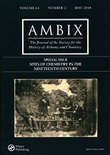
Ambix
Connecting Empirical Science with Philosophical PerspectivesAmbix, published by Taylor & Francis Ltd, is a distinguished journal specializing in the fields of Chemistry and the History and Philosophy of Science. With an ISSN of 0002-6980 and an E-ISSN of 1745-8234, Ambix has been a pivotal platform for scholars since its inception in 1937, providing a unique interdisciplinary perspective that bridges empirical science with philosophical inquiry. The journal is recognized for its rigorous peer-review process and maintains a solid impact within the academic community, reflected in its ranking in both the Q4 quartile for miscellaneous Chemistry and Q3 for History and Philosophy of Science. Despite not being an Open Access publication, it offers crucial insights for researchers and students seeking to deepen their understanding of the dynamics between scientific practices and philosophical thought. With articles spanning various eras and themes, Ambix remains an essential resource for those exploring the historical and conceptual dimensions of chemistry and the sciences more broadly. For further inquiries, the journal’s editorial office is based in the United Kingdom, specifically at 2-4 Park Square, Milton Park, Abingdon, OX14 4RN, Oxon, England.
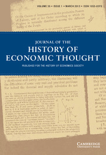
Journal of the History of Economic Thought
Engaging with the Past to Understand Economic FuturesThe Journal of the History of Economic Thought, published by Cambridge University Press, stands as a vital contributor to the field of economic history, providing an esteemed platform for scholarly discourse and research since its inception in 1970. With an ISSN of 1053-8372 and an E-ISSN of 1469-9656, this journal features a robust editorial agenda that examines the evolution of economic ideas through a critical and historical lens. Notably, it has achieved a commendable Q2 ranking in both Arts and Humanities and Economics, Econometrics and Finance categories, along with a Q1 ranking in History and Philosophy of Science, highlighting its academic rigor and relevance in contemporary discourse. The journal's commitment to fostering a comprehensive understanding of economic thought positions it as a critical resource for researchers, professionals, and students eager to delve into the intricate ties between economic theories and historical contexts. Although it does not offer open access, the journal continues to inspire and inform scholarship within diverse economic narratives and philosophical inquiries, thus enriching the landscape of economic history.
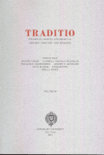
TRADITIO-STUDIES IN ANCIENT AND MEDIEVAL HISTORY THOUGHT AND RELIGION
Charting the Course of Thought Through TimeTRADITIO - Studies in Ancient and Medieval History, Thought and Religion is a distinguished academic journal published by Cambridge University Press, dedicated to the exploration and analysis of historical, philosophical, and religious narratives from ancient and medieval periods. The journal's ISSN is 0362-1529 and its E-ISSN is 2166-5508. Renowned for its rigorous scholarship, it enjoys a notable standing in the academic community, reflected in its 2023 category quartiles which place it in the second and third tiers across critical fields such as Literature and Literary Theory, Philosophy, Religious Studies, and Visual Arts and Performing Arts. With its comprehensive scope that encompasses multidisciplinary approaches, TRADITIO provides an essential platform for researchers, academics, and students alike to engage deeply with the complexities of historical thought and cultural practices. Although the journal operates within the traditional subscription model, its significance is underscored by impressive Scopus rankings, indicating its high visibility and impact within the arts and humanities sectors. We invite you to discover the richness of ancient and medieval studies through the pages of TRADITIO.
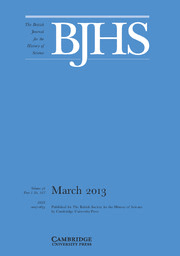
BRITISH JOURNAL FOR THE HISTORY OF SCIENCE
Unfolding the tapestry of scientific history.The British Journal for the History of Science is a premier academic publication dedicated to exploring the intricate relationship between science and society throughout history. Published by Cambridge University Press, this journal features a rich blend of original research articles, critical reviews, and scholarly discussions that illuminate the development of scientific ideas and practices from antiquity to the modern era. With a strong reputation reflected in its Q1 classification in History and Q2 in History and Philosophy of Science for 2023, this journal plays an essential role in advancing the field by engaging researchers, professionals, and students alike. The journal's commitment to intellectual rigor and cross-disciplinary dialogue fosters a deeper understanding of how scientific thought has shaped our world. Although it does not offer open access, the journal maintains a strong academic footprint, making significant contributions to historical scholarship. Join a community of scholars who are passionate about unfolding the rich tapestry of scientific history, as the British Journal for the History of Science continues to publish cutting-edge research until 2024.

Iberian Journal of the History of Economic Thought
Exploring the Roots of Economic Ideas in IberiaThe Iberian Journal of the History of Economic Thought, published by Ediciones Complutense, serves as a pivotal platform for the dissemination of scholarly research related to the history of economic ideas in the Iberian context. With its Open Access model established since 2014, this journal aims to enhance visibility and accessibility of research findings, making valuable contributions to the field for researchers, professionals, and students alike. Although currently lacking a quantified impact factor, the journal's dedication to rigorous academic standards ensures that it continues to attract high-quality submissions that reflect contemporary discussions in economic thought. Located in the vibrant academic hub of Madrid, Spain, the journal seeks to explore the rich tapestry of economic theories and practices that have emerged across the Iberian Peninsula, offering a crucial resource for those interested in the historical development of economic concepts and their relevance today. Whether you are seeking to publish your research or delve into the rich archives of past economic theories, the Iberian Journal of the History of Economic Thought stands out as an essential resource in the evolving landscape of economic scholarship.
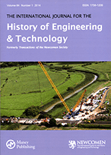
International Journal for the History of Engineering & Technology
Uncovering the Past, Shaping the Future of Engineering.The International Journal for the History of Engineering & Technology, published by Taylor & Francis Ltd, is a notable platform dedicated to exploring the historical development and technological advancements in the field of engineering. With an ISSN of 1758-1206 and an E-ISSN of 1758-1214, this journal presents an intersection of engineering and social sciences, currently categorized within the Q4 quartile for both Engineering (miscellaneous) and Social Sciences (miscellaneous) as of 2023. The journal has been serving the academic community since its inception in 2012 and aims to provide a space for both established researchers and emerging scholars to disseminate insights on the evolution of engineering practices, technologies, and their societal implications. While it operates under a traditional access model, it offers a valuable repository of knowledge for those invested in understanding the past and present contexts of engineering and technology. Researchers and practitioners alike will find this journal essential for deepening their appreciation of the historical contexts that shape contemporary engineering methodologies.

Journal of Astronomical History and Heritage
Exploring the Cosmos Through TimeWelcome to the Journal of Astronomical History and Heritage, a distinguished publication that delves into the fascinating intersections between astronomical science and its historical context. Published by University Science & Technology China (USTC), this journal aims to promote a deeper understanding of how humanity's understanding of the cosmos has evolved over time. With a focused scope that encompasses the historical narratives of astronomy, this journal serves as a pivotal resource for researchers, professionals, and students in the fields of Astronomy, Astrophysics, and History. Although it is currently categorized in the fourth quartile for Astronomy and Astrophysics and in the second quartile for History, the journal holds an impressive rank in the arts and humanities category, reflecting its 88th percentile standing. The journal, which has aggregated notable works from 2019 to 2024, represents a unique platform for innovative scholarship and discussions related to our astronomical heritage. While offering limited access options, it strives to contribute significant knowledge to the field, fostering collaboration and exchange among scholars dedicated to understanding the past as we explore the universe.

Nuncius-Journal of the History of Science
Illuminating the Past, Inspiring Future InquiryNuncius - Journal of the History of Science, published by BRILL, is a vital resource dedicated to the exploration and analysis of the intricate relationship between science and its historical context. Established with the goal of fostering scholarly discussion, this journal serves as a platform for researchers and historians to present their findings and interpretations regarding the evolution of scientific thought. With an impact factor reflective of its academic rigor and ranked in the Q3 category in the field of History and Philosophy of Science, it offers a rich archive of articles spanning converged years from 1986 to 2024. Nuncius encourages submissions that advance the understanding of science's impact on society, culture, and its philosophical underpinnings, making it a key reference for those engaged in the histories that define modern scientific inquiry. Situated in the scholarly landscape of the Netherlands, Nuncius remains an essential read for professionals, students, and academics seeking to deepen their knowledge in this significant field.

CENTAURUS
Bridging Scientific Innovation and Philosophical ReflectionCENTAURUS is a prestigious journal dedicated to the History and Philosophy of Science, published by BREPOLS PUBL in the United States. With a storied history dating back to its inception in 1950, CENTAURUS has consistently provided a platform for critical engagement and scholarly discourse in the realm of scientific development and its philosophical implications. Recognized for its academic rigor, the journal holds a commendable Q2 ranking in the History and Philosophy of Science category for 2023, reflecting its substantial contribution to the field, as evidenced by its ranking in the top 11% of 223 journals in Scopus. Although it operates on a subscription-based model, the journal is a vital resource for researchers, professionals, and students seeking insightful analyses and discussions on the interplay between science and its philosophical dimensions. Published from Turnhout, Belgium, CENTAURUS continues to shape the landscape of scientific thought with its well-curated articles that examine over a decade's worth of scholarly contributions.

Ingenium-Revista Electronica de Pensamiento Moderno y Metodologia en Historia de la Ideas
Enriching Understanding of Ideas Across Disciplines.Ingenium - Revista Electronica de Pensamiento Moderno y Metodologia en Historia de la Ideas is a pivotal academic journal dedicated to the exploration and analysis of modern thought and methodological frameworks in the history of ideas. Published by the esteemed Universidad Complutense de Madrid, this journal serves as a vital platform for scholars interested in interdisciplinary studies that merge philosophy, history, and social sciences. With an ISSN of 1989-3663, Ingenium stands at the forefront of academic discourse, encouraging the dissemination of knowledge without barriers through its Open Access principles. By fostering a rigorous academic environment, Ingenium aims to enrich the scholarly community's understanding of the evolution of ideas and their impact on contemporary thought. As such, it is an essential resource for researchers, professionals, and students striving to navigate the complexities of modern intellectual landscapes.